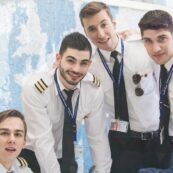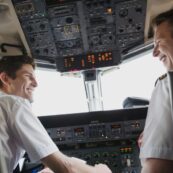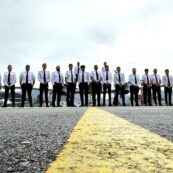The New Airline Pilot Persona: Gen Z Takes the Cockpit

From the post-war glamour of the cockpit to the disciplined professionalism of late-20th-century aviation, the image of the airline pilot has long been defined by hierarchy, resilience, and tradition.
But a new generation is entering the flight deck—and they’re bringing different priorities with them.
Born into a fully digital world, Gen Z pilots are:
- tech-native,
- socially aware,
- and increasingly unwilling to compromise on flexibility or purpose.
Their expectations are reshaping everything from training methods to leadership culture.
But how will this shift redefine the role and responsibilities of tomorrow’s pilots?
As the industry competes for future talent, the question is no longer whether change is necessary, but how quickly it can happen. Flight academies like Egnatia Aviation are already responding, aligning their programmes with the expectations of a workforce that seeks both skill and meaning.
What follows is an examination of how Gen Z is reshaping aviation from the inside—and how the sector must evolve to meet the moment.
Purpose Over Prestige: The Values Revolution
The professional identity of the airline pilot is no longer built solely on technical expertise or hierarchical advancement. Gen Z candidates—defined not only by their digital fluency but by their values—are bringing a different set of expectations to the flight deck. Prestige and permanence matter less than impact, autonomy, and alignment.
According to the 2024 Deloitte Global Gen Z and Millennial Survey, nearly three in four Gen Zs say an employer’s societal contributions influence their career decisions. This is a generation that expects institutions to lead with values, not just vision. They seek flight training that supports personal growth and psychological readiness, encompassing not only technical proficiency but also genuine mental health resources, diverse representation, and transparency across all levels of leadership.
That shift comes with implications. Gen Z places a premium on flexibility over rigidity, expecting work-life integration, not just balance. Traditional cadet pipelines that prize conformity, are giving way to more personalised learning paths, and support systems that respect the individual as well as the professional. As Egnatia Aviation has recognised, addressing emotional readiness and confidence-building in training is no longer optional—it’s essential.
Today’s demographic also defines its digital predilections. According to a recent Forrester report, younger employees are accustomed to digital-first experiences, characterised by mobile delivery, automation, and real-time collaboration. Within aviation, that translates to AI-enabled systems, immersive simulators, and data-based learning platforms. Flight academies that fail to match this pace, do risk in becoming irrelevant.
Just as critically, Gen Z challenges organisational culture. They expect inclusive representation across leadership, transparent communication, and a clear stance on social issues. As noted in this aviation industry generational analysis, Gen Z cadets are more likely to question outdated practices and push for institutional reform. Inclusion is no longer aspirational—it’s fundamental.
While Baby Boomers drew inspiration from the post-war Golden Age of aviation and Millennials sought job security, Gen Z pilots represent a dramatic shift. They question the status quo, seek diversity and inclusion, and actively challenge the “but that’s how it’s always been” mentality.
The New Standard: Gen Z Demands in Aviation Training
Digital-First Learning Environments
Printed manuals and outdated classroom setups aren’t enough. Gen Z cadets expect sophisticated flight training apps, real-time dashboards, and simulators that reflect airline-level precision. Digital responsiveness is a baseline expectation, not a bonus.
More than 36% of Gen Z students prefer an interactive learning experience. For flight training, it can mean implementing simulation-based training, gamified learning solutions, and individualised analysis. Students wish to participate in interactive, physical activities that have a direct connection to their future role as pilots.
Tailored Education and Continuous Feedback
One-size-fits-all, cookie-cutter training falls flat for training Gen Z. They want a personalised approach to learning, including tailored coaching, the ability to set their own pace and consistent and actionable feedback.
Career guidance should be threaded throughout training, offering specialised pathways—from sustainability leadership to global airline operations.
Inclusive Support Systems and Global Perspectives
Mental health is important. Gen Z wants to openly explore mental wellness issues, particularly in high-pressure fields like aviation. They expect academies to provide genuine solutions, rather than just a box to check.
Diversity isn’t optional either. Gen Z cadets wish to see the world reflected in their classroom, including their instructors, who understand varied multicultural learning techniques. Their coursework must represent a global perspective and prepare cadets to operate confidently within it.
How Egnatia Aviation Adapts to Gen Z Needs
Technology Integration Beyond Basic Training
Egnatia Aviation recognises that today’s climate demands innovation at every stage. With a remarkable reputation as an EASA-approved training institute, Egnatia Aviation embeds technology into every step of training—be it state-of-the-art simulators or tracking student performance. The training aligns with the methodologies used by modern airlines, helping trainees transition into their professional settings almost seamlessly.
Moreover, the academy has a strong industry focus. Egnatia Aviation undertakes training for cadets of major airlines, including Olympic Air, Aegean Airlines, Iraqi Airways, and Wizz Air. The flight school also provides pilots to EasyJet, Qatar Airways, Emirates, Air Arabia, Kuwait Airways, Oman Air, etc., fulfilling the Authority and Airline recruitment requirements.
Values-Driven Training Philosophy
Based in Lydia Aerodrome in Kavala, Greece, Egnatia gives homage to tradition while embracing innovation. The academy’s international focus and emphasis on guidance and mentorship are aligned with the tenets and values that Gen Z embraces.
Their training implements a philosophy of collaboration over hierarchy, where classmates learn from one another, and encourage open communication between instructors and students.
Transparent Learning Support Systems
Egnatia’s approach prioritises flexibility and personalised attention—core Gen Z expectations.
Students receive regular feedback, customised career guidance, and access to international networking opportunities that align with their global mindset.
The school’s partnership with leading airlines provides the real-world context that Gen Z craves, showing direct connections between training and meaningful career outcomes.
Alumni Voices from Gen Z
Why Gen Z Chooses Egnatia Aviation for their Airline Pilot Training
Digital-era cadets are drawn to Egnatia Aviation’s blend of cutting-edge tech and a values-based learning environment. The international student community reflects their global perspective. Many cite the academy’s commitment to sustainability and cultural awareness as key deciding factors.
One alumnus shared, “My pilot training lasted only 17 months from A to Z. The school provides all the suitable conditions for the best and fastest way to the cockpit’s right seat. Yet, they expect full dedication and commitment from students.”
Career Aspirations of Digital-Era Aviators
Gen Z pilots aspire to more than flying hours. Gen Z recruits imagine a world in which they also leverage their careers to build a more sustainable planet, champion inclusivity, and integrate emerging technologies. They imagine careers as thought leaders in aviation, not just flight crew.
Flying as a Platform for Change
For this generation, aviation represents an opportunity to create positive change on a global scale.
Gen Z as pilots view cockpits as platforms for environmental sustainability, promoting global culture understanding, and proving that traditional industries can evolve—and why they must change—while maintaining safe and reliable operations.
Elevating Standards for the Future of Flight
For the Gen Z Pilot, flying isn’t just a career—it is a platform. With a focus on values, innovation, and eco-advocacy, the next generation of aviators is challenging the framework of what it means to be a pilot.
Their demands for mental health support, technology integration, equality and sustainability have already paved the way for unprecedented shifts in how a flying school should be and what an aviation job could look like.
At Egnatia Aviation, this transformation is already underway. Through a commitment to transparency, global perspective, and forward-thinking training models, the academy is not simply adjusting to new demands—it is setting the pace.




